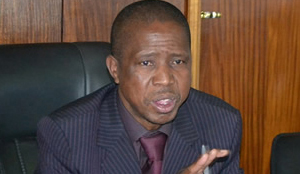JUSTICE Minister Edgar Lungu’s call that the office of the Investigator General or the Ombudsman should take a lead role in promoting justice and good governance in the country is timely.
The minister asked Investigator General Caroline Sokoni to make her office available and known to members of the public, who may know less or nothing at all about how this important constitutional office operates.
In today’s society, people are frustrated by delays, discourtesy and bias, among other issues, across the public service and have for too long been denied the services of a resolute public defender or, rather, they are not aware of such an establishment in their midst.
The Investigator General or the Ombudsman is considered to be one of the essential institutions that a Constitution has but, judging by the sentiments by the Justice minister, the profile of the office has diminished to the point where the majority of citizens have no idea what an Ombudsman does.
This means that the office-bearer needs to engage the public and establish him/herself not only as a feature of our Constitution but also a feature of systems of administrative and civil justice.
Given the lack of public awareness that may exist, it is important and prudent that the office formulates a public education strategy, to help boost awareness and the functions on the operations of this vital establishment among members of the public.
The Constitution establishes that the Ombudsman may investigate any action taken by any department of Government or any other authority or by the President, ministers, officers or members of such a department or authority.
Therefore, the office serves as an important part of ensuring good governance in society.
The lack of awareness about operations of this cardinal agency could largely be that there is no public track record of the office and what it has accomplished in the years that it has been functional, thus it is fundamental that achievements registered are made public as part of a deliberate awareness campaign to build public confidence.
The Ombudsman’s office is a mechanism that gives citizens a fair means of resolving problems which may crop up in dealing with the public service and, where necessary, holding systems to account.
In short, the Ombudsman is offering citizens a form of dispute resolution outside of the courts and also ensures public accountability.
The emphasis is on resolving disputes between citizens and Government agencies and the services are available to every citizen.
This means that if one has a complaint with a particular Government agency and has difficulty resolving it, such a complaint can be tabled before the Ombudsman.
Further, anyone can make a complaint to the Ombudsman. You can complain on your own behalf or for someone else if they are unable to make the complaint.
While judicial reforms are ongoing in the administrative justice system, the Ombudsman provides citizens with an opportunity to have their complaints of maladministration addressed.
Following calls by the Justice minister, Ms Sokoni and her staff now have a responsibility to inform the public of the services which are available to them.
People will be interested to know the kind of matters they can forward to this important office.
The real test in the capacity of the office of Investigator General lies in whether it can truly champion the rights of aggrieved citizens in the country and help to focus the attention of public officials on the needs of the people they serve.
Therefore, it is a timely reminder to the Ombudsman from Mr Lungu to create a solid relationship with citizens on how and when to access the services of this public institution in the dispensation of justice. OPINION







